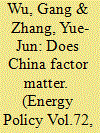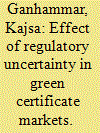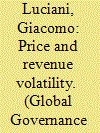|
|
|
Sort Order |
|
|
|
Items / Page
|
|
|
|
|
|
|
| Srl | Item |
| 1 |
ID:
132599


|
|
|
|
|
| Publication |
2014.
|
| Summary/Abstract |
Whether China's crude oil imports are the culprit of oil price volatility these years has not been quantitatively confirmed. Therefore, this paper empirically investigates the role of China's crude oil net imports in Brent price changes from October 2005 to November 2013 based on an econometric analysis. The results indicate that, during the sample period, China's crude oil imports do not significantly affect Brent price changes, no matter in the long run or short run. Therefore, the blame for China's crude oil imports to cause the dramatic fluctuations of international oil price has no solid evidence. Also, there exists significant uni-directional causality running from the Brent price to China×s crude oil imports at the 5% level. Besides, the response of the Brent price to China×s crude oil imports is found positive but slight, and the Brent price responds more significantly to US dollar exchange rate and OECD commercial inventory than to China's crude oil imports in the short run. Finally, the contribution of China×s crude oil imports to Brent price movement is about 10%, which is less than that of US dollar exchange rate but larger than that of Indian crude oil imports or OECD commercial inventory.
|
|
|
|
|
|
|
|
|
|
|
|
|
|
|
|
| 2 |
ID:
150925


|
|
|
|
|
| Summary/Abstract |
This study models fundamental features of current and prospective policies encouraging adoption of residential photovoltaic (PV) systems. A key finding is that time-of-day (ToD) pricing can enhance or worsen the economics of PV systems. Moreover, increased responsiveness of electricity demand to its price diminishes the effectiveness of ToD pricing in the absence of net metering, but does not affect it otherwise. An application to plausible conditions in the State of Indiana, USA, shows that current policies are unlikely to trigger adoption by a risk-neutral forward-looking residential customer. However, adoption of PV systems can be induced if the Federal Tax Credit is increased to cover 48% of capital cost (instead of the current 30%), which could imply a cost to the Federal Government of about $0.95/kW of installed capacity depending on the panel’s size. We demonstrate that implementation of ToD pricing can trigger adoption under a range of on- and off-peak price combinations. But our analysis also shows that the cost-effectiveness of ToD pricing is enhanced at higher ratios of on-peak to off-peak prices.
|
|
|
|
|
|
|
|
|
|
|
|
|
|
|
|
| 3 |
ID:
181441


|
|
|
|
|
| Summary/Abstract |
European Commission favours market-based support policies, such as markets for tradable green certificates, to promote renewable energy. Meanwhile, these instruments have received critique for exposing investors to large price risk as the level of support is determined by the market price of certificates. Using a two-step procedure, this study builds upon the work of Fagiani and Hakvoort (2014) by firstly examining how regulatory interventions in the Swedish-Norwegian certificate market affect price volatility, focusing particularly on the period after Norway joined in 2012. The results show that interventions in the market exacerbate price risk by resulting in regimes of increased volatility. They indicate that, contrary to policymakers expectation, prices did not stabilise after the market integration with Norway. Employing a real options approach, the study further proceeds to demonstrate that price risk increases the threshold for immediate development of Swedish wind power projects; a one standard deviation increase in certificate price volatility is estimated to reduce the probability of project development by 12%. These findings illustrate that regulatory uncertainty in terms of high price volatility disrupts the investment climate in certificate markets, ultimately affecting cost-effectiveness of such policy.
|
|
|
|
|
|
|
|
|
|
|
|
|
|
|
|
| 4 |
ID:
125455


|
|
|
|
|
| Publication |
2013.
|
| Summary/Abstract |
This paper examines how applying different combinations of excise and sales taxes on motor fuels impact the volatility of retail fuel prices and tax revenues. Two features of gasoline and diesel markets make the choice of tax mechanism a unique problem. First, prices are very volatile. Second, demand for motor fuels is extremely inelastic. As a result, fuel expenditures vary substantially over time. Tying state revenues to these expenditures, as is the case with a sales tax, results in a volatile stream of revenue which imposes real costs on agents in an economy. On July 1, 2010, California enacted Assembly Bill x8-6, the "Gas Tax Swap", increasing the excise tax and decreasing the sales tax on gasoline purchases. While the initial motivation behind the revenue neutral swap was to provide the state with greater flexibility within its budget, we highlight that this change has two potentially overlooked benefits; it reduces retail fuel price volatility and tax revenue volatility. Simulating the monthly fuel prices and tax revenues under alternative tax policies, we quantify the potential reductions in revenue volatility. The results reveal that greater benefits can be achieved by going beyond the tax swap and eliminating the gasoline sales tax entirely.
|
|
|
|
|
|
|
|
|
|
|
|
|
|
|
|
| 5 |
ID:
176104


|
|
|
|
|
| Summary/Abstract |
With more renewables on the Swedish electricity market, while decommissioning nuclear power plants, electricity supply increasingly fluctuates and electricity prices are more volatile. There is, hence, a need for securing the electricity supply before energy storage solutions become widespread. Electricity price fluctuations, moreover, affect operating income of nuclear power plants due to their inherent operational inflexibility. Since the anticipated new applications of hydrogen in fuel cell vehicles and steel production, producing hydrogen has become a potential source of income, particularly when there is a surplus supply of electricity at low prices. The feasibility of investing in hydrogen production was investigated in a nuclear power plant, applying Swedish energy policy as background. The analysis applies a system dynamics approach incorporating the stochastic feature of electricity supply and prices. The study revealed that hydrogen production brings alternative opportunities for large-scale electricity production facilities in Sweden. Factors such as hydrogen price will be influential and require in-depth investigation. This study provides guidelines for power sector policymakers and managers who plan to engage in hydrogen production for industrial applications. Although this study was focused upon nuclear power sources, it can be extended to hydrogen production from renewable energy sources such as wind and solar.
|
|
|
|
|
|
|
|
|
|
|
|
|
|
|
|
| 6 |
ID:
093530


|
|
|
|
|
| Publication |
2010.
|
| Summary/Abstract |
This paper contains a tentative suggestion of how to take into account the value of changes in price volatility in real world cost-benefit analyses. Price volatility is an important aspect of security of supply which first of all concerns physical availability, but assuming that consumers are risk averse, security of supply can also be viewed as a matter of avoiding oscillations in consumption originating from volatile prices of for instance oil. When the government makes transport-related choices on behalf of the consumers, the effect on oscillations in general consumption should be included in the policy assessment taking into account the most significant correlations between prices of alternative fuels and between fuel prices and consumption in general. In the present paper, a method of valuing changes in price volatility based on portfolio theory is applied to some very simple transport-related examples. They indicate that including the value of changes in price volatility often makes very little difference to the results of cost-benefit analyses, but more work has to be done on quantifying, among other things, consumers' risk aversion and the background standard deviation in total consumption before firm conclusions can be drawn.
|
|
|
|
|
|
|
|
|
|
|
|
|
|
|
|
| 7 |
ID:
104442


|
|
|
|
|
| Publication |
2011.
|
| Summary/Abstract |
Price volatility is a major problem for all commodity exporters because it translates into direct or indirect volatility of government revenue. Should a developing country's state be responsible for isolating the domestic economy from the consequences of fluctuating international commodity prices? This article argues that this is an essential function of the state and a crucial component of its legitimacy. Recently, the establishment of stabilization funds has been regarded as an essential component of good governance, notwithstanding the persistence of major problems. As an alternative, this article proposes the use of resource revenue for establishing endowments of autonomous public institutions with well-defined developmental goals, or furnishing the equity for strategically important commercial corporations. The latter opens the door to an interesting perspective on the potential path toward progressive democratization of the rentier states.
|
|
|
|
|
|
|
|
|
|
|
|
|
|
|
|
| 8 |
ID:
127290


|
|
|
|
|
| Publication |
2014.
|
| Summary/Abstract |
Price volatility in green certificate markets reflects uncertainty over future prices, representing a major source of risk for renewable energy generators. Price risk is considered the principal deficiency of this market-based policy since it causes investors to require higher returns. Moreover, investors are exposed to regulatory risk; namely, the risk that a change in the regulation will materially impact the certificate price. Regulatory uncertainty is reflected in market volatility exacerbating certificate price risk. Using an econometric approach, we investigate the role of regulatory changes on price volatility in the Swedish certificate market. The results of our analysis indicate that regulatory changes strongly affect certificate markets, resulting in periods of higher volatility. Moreover, we analyze whether certificate price volatility has changed after creating a joint Swedish/Norwegian market. Results indicate that the ambivalence surrounding the creation of this bigger market led to a period of increased price volatility between 2010 and 2011. Overall, this article brings a better understanding of the role of regulatory uncertainty on certificate markets, and gives evidence for its negative impact in terms of increased price volatility.
|
|
|
|
|
|
|
|
|
|
|
|
|
|
|
|
|
|
|
|
|